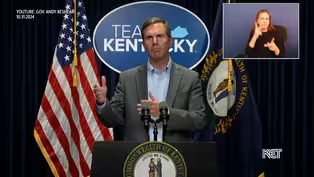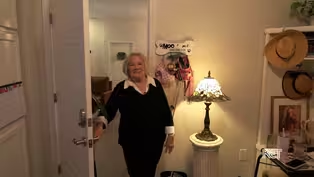
Daylight Saving Time and Your Health
Clip: Season 3 Episode 112 | 2m 33sVideo has Closed Captions
An expert explains how ending Daylight Saving Time can impact your health.
Daylight Saving Time comes to an end this weekend. The changing sunset time can affect people's sleep and health. What can you do about it? We asked an expert at the University of Louisville.
Problems playing video? | Closed Captioning Feedback
Problems playing video? | Closed Captioning Feedback
Kentucky Edition is a local public television program presented by KET

Daylight Saving Time and Your Health
Clip: Season 3 Episode 112 | 2m 33sVideo has Closed Captions
Daylight Saving Time comes to an end this weekend. The changing sunset time can affect people's sleep and health. What can you do about it? We asked an expert at the University of Louisville.
Problems playing video? | Closed Captioning Feedback
How to Watch Kentucky Edition
Kentucky Edition is available to stream on pbs.org and the free PBS App, available on iPhone, Apple TV, Android TV, Android smartphones, Amazon Fire TV, Amazon Fire Tablet, Roku, Samsung Smart TV, and Vizio.
Providing Support for PBS.org
Learn Moreabout PBS online sponsorshipWe set our clocks back an hour Saturday night as Daylight Saving time ends.
The changing sunset time can affect people sleep and health.
So what can you do about it?
We asked an expert at the University of Louisville.
The lack of light, the relative lack of light in those early afternoon or late afternoon or early evening hours certainly makes some people feel more drowsy or fatigued than they otherwise would be.
So that earlier sense of fatigue, lack of energy, it can stay there, just the suboptimal feeling of energy versus overtly dozing off before one wants to.
But looking on the positive side, more light in the morning perhaps can offset that somewhat feeling more energized naturally by that sunlight.
The number one thing that induces wakefulness in humans tends to be light, which probably isn't a surprise.
And I would say to not just try to fret about it too much, it is outside of our control as far as having natural sunlight, which is ideal, but we can modify our our space, our homes to just create some more light as much as we can, especially once sunset is occurring apart from light, just increasing your activity levels, which I know is challenging because you don't want to be vigorously working out within 90 minutes or so of your desired bedtime.
But if you can find a window before that to walk treadmill, bike, you know, sometimes it can be creative when the outside conditions are not great, but moderately increasing.
Your activity levels also induces more wakefulness compared to fatigue and drowsiness.
Essentially, it's very much ingrained in our biophysical makeup to be awake for 16 to 17 hours and then therefore other side of that, sleeping for 7 to 8 hours.
That does not substantially change.
Even if we feel tired a bit earlier, someone might get more hours of sleep, extra, even minutes at up, but hours that doesn't necessarily translate to feeling more energized during the day, much more or much less than really that 7 to 8 hour window doesn't doesn't translate to feeling much better.
So it's possible that someone sleeps a bit more.
But that drive to wake up after 78 hours usually pervades.
So the good news is Daylight Saving Time will start back again on March 9th, 2025.
Can't wait.
Beshear Pushing Popular Vote Over Electoral College
Video has Closed Captions
Clip: S3 Ep112 | 2m 47s | Beshear says Kentucky voters would benefit if the U.S. did away with the Electoral College. (2m 47s)
Video has Closed Captions
Clip: S3 Ep112 | 4m 59s | A distinct housing option gains traction with seniors. (4m 59s)
Sec. Adams: Viral Voting Video is Misleading
Video has Closed Captions
Clip: S3 Ep112 | 6m 7s | A TikTok video went viral on the first day of early, in-person voting in Kentucky. (6m 7s)
Providing Support for PBS.org
Learn Moreabout PBS online sponsorship
- News and Public Affairs

Top journalists deliver compelling original analysis of the hour's headlines.

- News and Public Affairs

FRONTLINE is investigative journalism that questions, explains and changes our world.












Support for PBS provided by:
Kentucky Edition is a local public television program presented by KET


